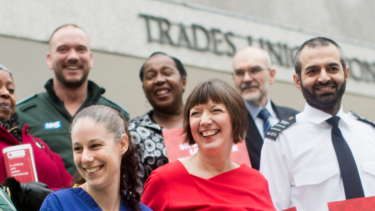General Council Report 2020
5.1 Introduction
The coronavirus pandemic put public services in the spotlight, with public attention focused on the important roles of key workers across the economy. While this recognition was welcome, public services went into the crisis weakened by years of cuts, pay restraint and privatisation. This has created major shortages of equipment and staff, and capacity issues in key areas. Despite the heroic efforts of public sector workers, austerity undermined the country’s response to the crisis.
No sectors were in a weaker position than social care and local government. The TUC has campaigned and lobbied for a new settlement for both these critical sectors, in line with resolution 65. This built on earlier work highlighting the extent of the damage caused by spending cuts, including our analysis of the disproportionate impacts on councils in deprived areas.
5.2 Education
Over the past year the TUC has worked closely with affiliated unions on policy and workforce issues relating to education in line with resolutions 56, 57, 61, 62 and 63, and composites 13 and 17. The input of all the education unions has informed the work of the General Council on education policy and wider campaigning on public services.
The General Council has endorsed some of the key recommendations of the review of post-18 education and funding chaired by Philip Augar, in particular proposals to: make investment in the FE estate and workforce a priority; provide a fully funded entitlement for all adults to achieve a minimum level three qualification; and increase financial support for adult FE and HE students through maintenance grants and bursaries. However, the TUC has consistently stressed that government would need to take forward a much more ambitious approach than that set out in the review.
During the past year the General Council has continued to give its support to the Love Colleges initiative coordinated by FE employers and unions. This campaign calls for increased investment in further education and a fair pay deal for all FE staff. Paul Nowak, TUC deputy general secretary, is a member of the Independent Commission on the College of the Future that is being coordinated by the Association of Colleges. The TUC facilitated two roundtable meetings involving the further education unions and the director of the Commission, and also submitted written evidence.
5.3 NHS
The TUC continues to campaign for a publicly owned, fully-funded NHS in line with resolutions 46, 49, 50, 51, and 52. We also continue to call for parity of funding between its constituent services, particularly mental health.
The TUC took part in the NHS’s 72nd birthday celebrations, supporting an online rally and using social media to demand more than weekly public clapping for the NHS and its staff.
Building on earlier work exposing the inadequacy of the 3 per cent real-terms funding increase for the NHS, we used our March 2020 Budget submission to highlight the ongoing crisis in staff recruitment and retention and make the case for a fully funded workforce strategy.
This followed our analysis of shortfalls in doctor numbers and government failure to meet staffing promises.
Mental health has remained a priority, supported by the TUC Disabled Workers’ Committee and the TUC Young Workers’ Forum. Together with campaigners such as Keep Our NHS Public, the TUC helped to organise a mental health crisis summit in September 2019.
We have applied the lessons from the NHS Social Partnership Forum’s work on bullying and harassment, working with Cabinet Office and public service employers to apply good practice across the public sector. The coronavirus crisis has underlined the need for NHS and social care staff to be able to raise workplace issues free from intimidation.
In line with resolution 47, the TUC continued to call for all NHS charges for migrants to be dropped. As well as working with groups such as Maternity Action, we raised concerns with MPs in our lobbying on the Immigration and Social Security Coordination Bill, adding to the pressure on government. In May, the government announced that NHS charges would be dropped for NHS and care workers. The TUC will continue to campaign with unions and allied groups for the charges to be dropped for all migrants.
In line with resolution 53, the TUC has continued to highlight mental health support services at work and in wider society, including inadequate perinatal maternity care.
5.4 Social care
The Covid-19 pandemic has been the ultimate stress test for adult social care. Structural issues that trade unions have highlighted for decades – insecure contracts; low pay; privatisation; inadequate funding – have made the impact of Covid-19 on the sector much worse.
In line with resolution 54, the TUC has been working with affiliates to develop a trade union vision for social care. We have made the case for sustainable funding, market reform and integration. We are also demanding comparable terms and conditions with NHS staff, underpinned by a sectoral collective bargaining agreement.
For May Day 2020, the TUC published analysis showing that 7 in 10 care workers earn less than £10 an hour. We published a joint statement with commissioner representatives on the need for adequate PPE, proper testing and safe hospital discharges into care homes. We are working with partners in the sector to agree a new deal for the workforce, including a new national skills and accreditation framework tied to a pay and grading structure.
5.5 Privatisation
The Covid-19 crisis has exposed how years of marketisation and outsourcing have weakened our public services and put the safety of workers and the public at risk. This has been evident in the PPE ‘crisis within a crisis’, caused by fractured and unwieldy supply chains that resulted from decades of outsourcing and offshoring.
Some outsourced workers have been forced to choose between following government advice to isolate without adequate sick pay and being able to put food on the table.
Ending and reversing privatisation and outsourcing has been central to the TUC’s public campaigning on public services in the last year. Composite 12 formed the basis for a number of recommendations in our A Better Recovery report. This made the case for in-house provision except where there is a public interest case for contracting out. These recommendations were adapted for regional recovery reports, which argued that insourcing and social value procurement should be at the heart of local and regional recovery plans.
The TUC’s report for the International Day of Justice for cleaners and security guards exposed how outsourcing has weakened terms and conditions, as well as eroding service quality. The TUC also developed a practical guide for reps on how to negotiate insourcing in their workplaces.
In addition to this public-facing work, we have continued to make the case for insourcing during regular meetings with government, through the Public Services Forum and other channels. We have also advocated insourcing to parliamentary select committee inquiries and the Labour Party.
In line with resolution 48, we have continued to work with unions and health campaigners to prevent the outsourcing of NHS services through wholly owned subsidiaries. Following successful campaigns in Wigan, Leeds and mid-Yorkshire, in the last year Frimley Health Foundation Trust and Bradford Teaching Hospitals Foundation Trust have abandoned plans for subsidiary companies.
5.6 Civil service
The civil service has played a crucial role in the coronavirus response, yet has faced inconsistent practices on safe working and the continuation of restructuring and redundancy programmes. The TUC has supported civil service unions in calling for these programmes to be suspended for as long as the crisis continues. We have emphasised this in meetings with ministers, and in oral and written evidence to the Lords select committee inquiry on the future of public services after the pandemic.
The TUC has called on HMRC to reconsider its reform plans in light of changing patterns of working post-coronavirus. We have also highlighted that a decade of staff cuts and under-investment left the DWP completely unprepared for the growth in Universal Credit claimants during the crisis.
5.7 Justice
In line with composite 15, the TUC has publicly supported calls to end and reverse the privatisation of probation. We welcome the recent decision by the Ministry of Justice to bring the rest of probation back into public ownership, following tremendous campaigning work by Napo, UNISON and all our justice sector unions.
We continue to work with criminal justice unions, through campaigns such as Joint Unions in Prison Alliance (JUPA), to ensure the sector guarantees the safety and welfare of all inmates and staff.
In line with resolution 67, the TUC supported the manifesto for justice. Although planned campaign work was disrupted by the general election and the coronavirus pandemic, we have continued to highlight the issues contained in the manifesto. Our submission to the Lords select committee inquiry on the future of public services after coronavirus also highlighted the parlous state of the justice system.
5.8 Public sector pay
Following a decade of pay restraint, public sector workers are still being paid on average £900 less in real terms today than they were in 2010.
The TUC has continued to campaign for fair pay for public sector workers. Our March 2020 Budget submission linked pay restraint to the crisis of recruitment and retention affecting swathes of the public sector. We set out the real-terms increases to departmental budgets that would be needed to ensure that public sector pay rises both keep up with the cost of living and begin to make good a decade of lost earnings. Our submission also reiterated our five tests for a fair pay deal for public sector workers: funded increases; fair pay awards across all public services; freedom for collective bargaining and genuinely independent pay review bodies; tackling low pay through the real living wage; and the restoration of earnings lost since 2010.
On May Day, TUC research set out the real-terms pay losses experienced by different public sector workers. Our study showed that nurses and community nurses in NHS band 5 are more than £3,000 worse off today than they were in 2010, and ambulance services drivers are £1,605 worse off.
Better public sector pay has also been central to the TUC’s vision for recovery from the pandemic, including the wider benefits of a public sector pay increase in the context of severely weakened economic demand. We have also coordinated union responses to the McCloud judgment, which ruled transitional protection in public sector pension schemes discriminatory on grounds of age, and continued to make the case for fair pensions for public sector workers.
5.9 Transport
In line with composite 3, the TUC has continued to campaign for an integrated, green public transport system. We have continued to highlight the need for investment in rail infrastructure, supporting HS2 as well as local rail investment priorities. We have campaigned for publicly owned, integrated rail infrastructure and highlighted the impact of the current fragmented franchise system on both investment and ticket pricing. UK consumers continue to experience one of the most expensive railways in Europe.
The TUC continues to be actively engaged in HS2 and support union calls to ensure we get maximum benefit from the project, including full union access to and cooperation with all contractors involved. We are also lobbying for the project to deliver benefits across the country, as part of an integrated transport solution.
Local transport has featured in the TUC’s campaigning work this year. We have worked with local and combined authority leaders in the North-West and in Yorkshire and the Humber to re-regulate bus services and to make the case for public ownership.
Stay Updated
Want to hear about our latest news and blogs?
Sign up now to get it straight to your inbox


